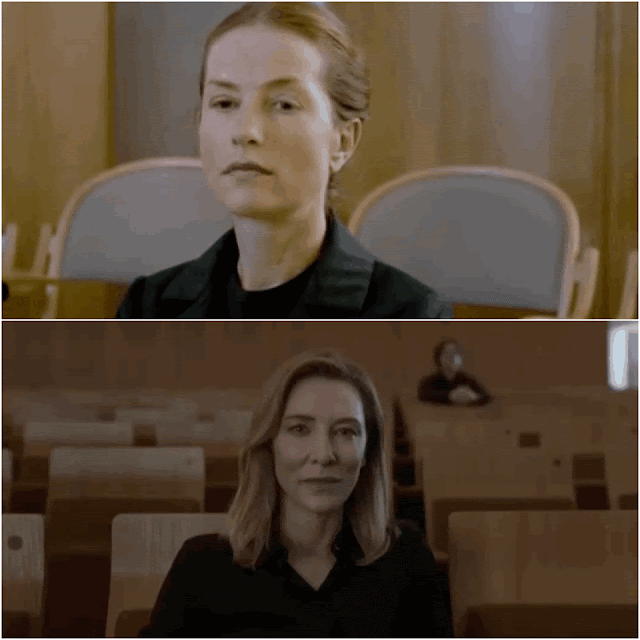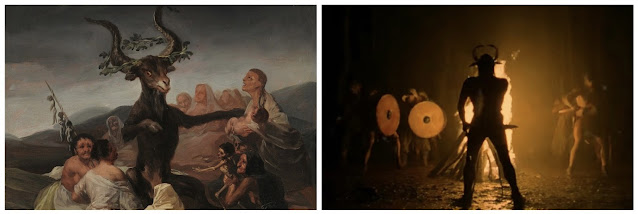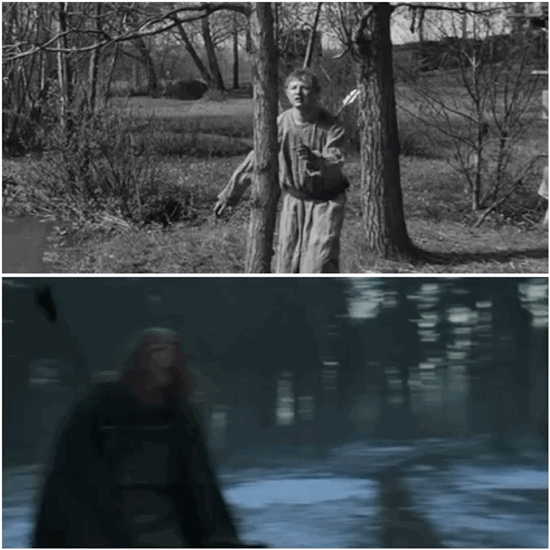I’m always fascinated when directors take long breaks between films. I think it’s rooted in my love of post-
Days Of Heaven Terrence Malick. Now…I’ve said it before and I’ll say it again - this myth about Terrence Malick going off to live in the mountains like a reclusive monk for 20 years between movies has been debunked (read “One Big Soul”). It’s like when people still believe that Werner Herzog pointed a gun at Klaus Kinski during the filming of
Fitzcaraldo even though that scenario has been cleared up as well.
With all that being said - I was very intrigued by the return of Todd Field as it’s been 16 years since
Little Children (similar to Malick, Field had a series of projects that couldn’t get off the ground during an almost 20 year gap). I’m not even a “fan” of Todd Field. I didn’t like
Little Children. I think had the film lost the silly voiceover narration and just focused on the relationship between the bully cop and the sex offender it would’ve been a more interesting & challenging film. And while
In The Bedroom was fine and had solid performances from the entire cast, I’m more fascinated with the ending and how messed up it is that I essentially agree with/understand the ending (I know co-signing vigilantism is wrong but I’m human and if I could get away with murdering someone that murdered someone close to me - I’d do it. It’s fucked up. I know…)
Todd Field is also just an interesting person. In addition to his spotty-yet “acclaimed” body of work thus far, he’s associated with Stanley Kubrick and his last film (for those of you that are unaware Todd Field played the pianist; Nick Nightingale in
Eyes Wide Shut and he was apparently mentored by Kubrick). He’s also one of the co-inventors of big league chew (?). And because he’s only directed two films in two decades prior to
Tár, he doesn’t even really have a signature style.
Little Children &
In The Bedroom look like they were made by two different directors (
Tár does have a few visual similarities to
Little Children).
A lot has happened between 2006 (
Little Children) &
Tár (2022). I’m not going to list everything off but “cancel culture” (or the myth/misconception of what cancel culture is) is certainly something that has become more prominent over the last 10-16 years. I use words like myth & misconception because once the dust settles, a lot of people who have been “cancelled” haven’t actually really been cancelled unless we’re talking about someone who has literally broken the law (or been accused of breaking the law) and had to go to jail which isn’t cancel culture. If we’re talking about standard recent examples like Louis CK or Roseanne or whoever - all that happened to people like that was they lost a show or had a temporary period where they went dark. They still stayed rich and still maintained most of their fans. To say they had everything taken away from them (an argument that has been used numerous times to defend them) is absolutely laughable. From a literal standpoint, they did not have everything taken away from them following their respective controversies. They lost a show. They had a platform temporarily taken from them but they eventually bounced back (again - I’m not talking about people who have broken the law or were accused of breaking the law as that’s an entirely different animal). I’m talking about people who were publicly persecuted/piled-on only to bounce back with another show, or a Grammy win or a new audience of fans/followers.

Take the fictional character of Lydia Tár for example. Long after the allegations she faces die down, her place in music history will still be cemented and she’ll still have plenty of money & resources regardless of how “rock bottom” we
might be led to believe she’s hit in the final act.
Part of me cringes even saying all this because I don’t want to be grouped in or associated with the cancel-happy folks who love to play both sides of the fence by saying cancel culture isn’t real all while still using the term cancel when they want to end someone’s career. These are the types of people that make lists of problematic artists who’s art one should avoid (I’d be embarrassed to be someone like that).
The often times irrational mob of entitled losers that sometimes rally the mindless troops in an effort to unfairly try to ruin someone’s life is certainly something that needs to absolutely go away (chances are these self-righteous dorks that try to “cancel” folks are terrible people themselves behind closed doors in some way). But that also doesn’t absolve a terrible person of being terrible or doing something absolutely stupid which often times gets softened down to a “simple mistake”. It is incredibly dangerous to post someone’s address & job information for the world to see because they posted something you don’t agree with on social media. But at the same time if you say something dangerous or unethical or intentionally button-pushing on a public platform, don’t act surprised or shocked when there’s drama.
If you’re a cop who openly shares your hatred for a specific group of people on Facebook or a therapist who shares their client’s private information on twitter (something that seems to happen semi-regularly these days), then maybe someone higher up should be contacted and maybe you should lose your job. But those are extreme examples.
Obviously I’m speaking in generalities. There are some strange smear campaigns out there disguised as cancelling someone. Take modern day Black men for example. The way Black men are vilified these days for certain specific personal preferences has become a personality trait by people who were once supposedly "allies". But these people don’t always fit the typical bad guy mold so it continues to go unchecked…
I’m saying all of this because at it’s core,
Tár is an individual story about the complexities of “cancel culture”. A lot of what I’m ranting about is addressed in the film.
To quote Todd Field himself from a recent New York Times interview:
No one’s innocent and no one’s entirely guilty, either. Absolutes are nonsense unless they’re sporting events - Todd Field
(I don’t know if I completely agree with that myself but I understand what he’s getting at)
Beyond that, it touches on everything from identity politics to the paranoia (…mental illness?) that can come with the pressure of being the best in your field. There are bound to be some Whiplash comparisons...
 |
Whiplash /
Tar |
What I appreciated most about
Tár is that the protagonist is not only a woman, but a problematic woman (had Lydia
Tár been a man this movie would have been so much easier & safer to digest). In the film Cate Blanchet is an accomplished yet somewhat self-sabotaging orchestra conductor spiraling downward. Field himself described the character of Lydia
Tár as “paranoid” and a “hypocrite” at a Venice film festival Q&A.
Often times when there’s a story of a complicated/problematic/trainwreck female protagonist, there’s usually a sympathetic tone or at least one important scene that sheds light on why she’s so “messed up”. Todd Field doesn’t really do that here and I really respect that choice (there is a scene in the film where goes back to her childhood home but it’s quick and still doesn’t give a whole lot of backstory). I guess there’s always a reason why people are the way they are but I don’t always care why or need a backstory. Sometimes people are just shitty and accountability can’t be dodged because of trauma or whatever popular key phrase people love to use to avoid fault.
I haven’t fully digested
Tár but I wanted to get a few initial thoughts out. I liked it but I don’t know how much i liked it (I’ll probably revisit this writing after a second viewing). Blanchet is great as is the rest of the cast (it was nice seeing Nina Haas in a prominent “mainstream” film).
The direction/“look” of the movie sometimes comes off as an American trying to do what they think is Michael Haneke’s Austrian-era style...
I wouldn’t be surprised if Field studied Haneke as a source of visual inspiration. Huge chunks of the film seem to subconsciously borrowing from
The Piano Teacher &
Cache. The movie even has little voyeuristic moments right out of Haneke’s
Happy End.
Field has namedropped Haneke in the past...
Well, that makes me happy that you say that. I mean, that's why, for me, films are exciting. That's why I like to go to movies. That's why I like to watch—I'm very careful about what I watch because of that. 'Cause I'm really romantic. Like I want to watch a film—I want to make sure there's no distractions. And then I want to walk around and walk a little bit for a few days. Lately I've been watching—I've kind of parceled it out, one a month...Michael Haneke's films. And those films just destroy me for, like, weeks. And it's really wonderful (laughing), you know? Because—I mean, have you seen all of Haneke's films? ...Have you seen all of them? Have you seen Code Unknown and Time of the Wolf and Piano Teacher?—Have you seen 71 Fragments? What a great film, huh? There's one film that he did—have you read any of Roth's books? He did this Philip Roth book—or is it Joe Roth?—about this strange and surreal period in German history. He did it as a long mini-series on German television; I've been trying to get my hands on that - Todd Field, Grouchoreviews.com
Tár is still very much it’s own movie. Putting aside the visual style, Haneke would’ve handled Tár's source material a bit differently. And no matter how overly-stylish & sleek Tár looks, it is very much an intentionally messy story.
Todd Field has made a strong return to the big screen and I would absolutely recommend this film to just about anyone (I’m looking forward to watching it again).




.gif)
.gif)


.gif)
.gif)









.gif)
.gif)







.gif)













